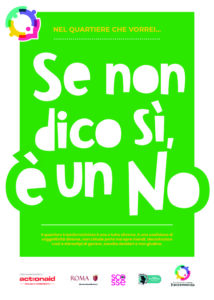

Education seen through women’s eyes: il report di Scosse
 Si pubblica il report della conferenza internazionale svolta a Praga il 14 e 15 marzo 2015, Education seen through women’s eyes, a cui ha partecipato anche l’Associazione con un paper sui progetti educativi e di formazione docenti svolti da SCOSSE nelle scuole.
Si pubblica il report della conferenza internazionale svolta a Praga il 14 e 15 marzo 2015, Education seen through women’s eyes, a cui ha partecipato anche l’Associazione con un paper sui progetti educativi e di formazione docenti svolti da SCOSSE nelle scuole.
Education Working Group
Education seen through Women’s Eyes
Symposium – Prague 14 and 15 Marsh 2015
In general
Symposium of 14 and 15 March in Prague gathered about fifty persons coming from eleven countries of Europe. Interventions concerned different sectors of education: teachers and university researchers, from all school levels, responsible persons of associations and representatives of the political world.
This allowed having an interdisciplinary approach about the condition and the formation of women in the educational systems in Europe: an analysis from the class and gender point of view.
A short historical glimpse showed that the place given to women in the formation is closely linked between their condition in the society and the role of the State, of its rules and its power. The central theme of the work, of precariousness and segregation emphasized the condition of women and the profession.
The ration between research and sciences underlined the persistence of the difficulty for women to reach high levels of the profession.
The budgetary cuts which are coming up to the abolition of free secondary education are supplementary obstacles for popular classes and women.
The pedagogic approach on gender education in schools has been highlighted and the opportunity to know practical experiences. Testimonies of tests in France and in Italy showed the difficulty to transform these things. Adversaries accuse pedagogic and didactic practise of gender to be totalitary propaganda.
We see an increased movement across Europe («march for life», «concerned parents») defending strict traditional image of the family, against diversity in this field, often including (extreme) conservative and far right-wing movements.
Interventions by speakers and women being there underlined that parity between women and men, despite the last century’s conquests, is not a reality yet. Patriarchy changed its face but is still present and strengthens in the crisis. Religions increase the phenomena and stereotypes which are firmly anchored in society.
To conclude, the symposium points summarizing the work done were discussed. One part recapitulates aspects which were considered as the principal illustration of the subjects discussed, and the second makes proposals.
Synthesis
1. Women’s conditions are closely linked/depend of the political and juridical context.
2. Women always transmitted and are still transmitting culture, but it is not considered as a value for the society, and, sometimes, by women themselves.
3. Disparity between women and men was always present and is continuing to day, with different modalities and nuances. It is necessary parity becomes a reality: without it, there is no democracy.
4. Professional career is penalized at all levels. The problem of men’s power plays an important role. Women’s image in dominant culture and the lack of services contribute to limit women’s access to several professions or professional levels. The ratio inside the family and the couple plays a prominent role for the place of women in the society.
5. They are different kinds of patriarchy in the countries of Europe. During the crisis, there is a hardening of social relations which strengthens to patriarchy. Religions increase the phenomena.
6. Women’s conditions are parallel to social conditions: the more poverty exists, the more the women become poor. Precariousness is linked with the EU austerity policies.
7. Globalization determines the formation and the research and the way of working and living.
8. Management of education is more and more effective: school surrenders facing the market and neo-liberalism laws.
9. The language leads culture and determines the cultural hegemony. Language is sexist and, therefore, contributes to ignore the presence of the woman and to reinforce man’s power: the stereotypes persist.
10. School has to form young people to respect the differences, to have a dialogue between students, to show the values of both genders in history, in literature, in society. Since infancy, a pedagogy of knowledge, of respect and dialogue between differences, adapting didactic methods to bring down the stereotypes.
Proposals
1. Working world:
– to change women’s situation and give wages parity
– to reduce weekly working time to 30-35 hours for all women and men
– to give a minimum salary and a ‘social’ salary
2. Society:
– to change women’s condition, modifying the dominating thinking and stereotypes which it leads, thanks to still very anchored patriarchy in the common conscience
– to create spaces for thinking about women’s conditions
3. Education:
– to go from the theory of competences for competitiveness in the economic world to the theory of knowledge of life
– to warrant free scholarship and formation for the whole life
– to fight against privatizations and budgetary cuts concerning educational system
– to form teachers to introduce a pedagogy promoting parity between girls and boys, to struggle against stereotypes and to valorize differences
– to lead a policy in the university world and research which eliminates any kinds of power between men and women and which is no more to the service of markets
4. Europe:
– to apply the same claiming policy and to favour the reciprocal knowledge in the whole Europe: Western Europe has not to be separated from Eastern Europe
– to collect experiences of pedagogic renewal and particularly those which promote parity and respect of differences of all countries and make them known (to put on a net)
5. Concretely:
– the Left has to fight to change school which will become determinant for the formation of citizens (women and men) responsible, able to hold a dialogue, in a reciprocal respect to build a society different, standing beside you, in which women and men have the same rights and responsibilities
Questions: how to make visible the talks said by the persons participating in the symposium?
– to publish a book about the symposium?
– to organize a debate on gender parity and et produce a text? Do it with other workings groups that ciuld be interested (lgtb, women, culture)?
– to draft a manifesto (or statements) in which school is described seen by feminist women?
– to ask people to sign the manifesto or statements by women and men from the political and education world?
 Articoli correlati
Articoli correlati  Ultimi articoli
Ultimi articoli -
È difficile anche solo decidere da dove iniziare per analizzare criticamente le Nuove indicazioni per la Scuola dell’infanzia e il Primo ciclo di istruzione da poco pubblicate sul sito del Ministero dell’Istruzione e del Merito come materiali per un presunto dibattito pubblico con il coordinamento di Loredana Perla e di Francesco Emmanuele Magni, e che […]
-
Arrivato alla sua V edizione “Build future, Stop Bullying” ha realizzato il gioco di carte educativo A pensarci bene. Il gioco nasce dalla campagna contro i bullismi #apensarcibene realizzata durante la III edizione del progetto. Le carte da gioco realizzate sono uno strumento educativo rivolto a persone dai 6 ai 14 anni da usare ovunque! […]
-
Generazione 5 è la nuova generazione che può creare un mondo a misura dei propri desideri. Come si immagina questo mondo? Noi glielo abbiamo chiesto. “Nel mondo Gen5” è la nuova campagna di SCOSSE realizzata con il Liceo Scientifico Nomentano di Roma all’interno del progetto “GENER-AZIONE 5 – Le nuove generazioni in azione per l’Obiettivo […]








